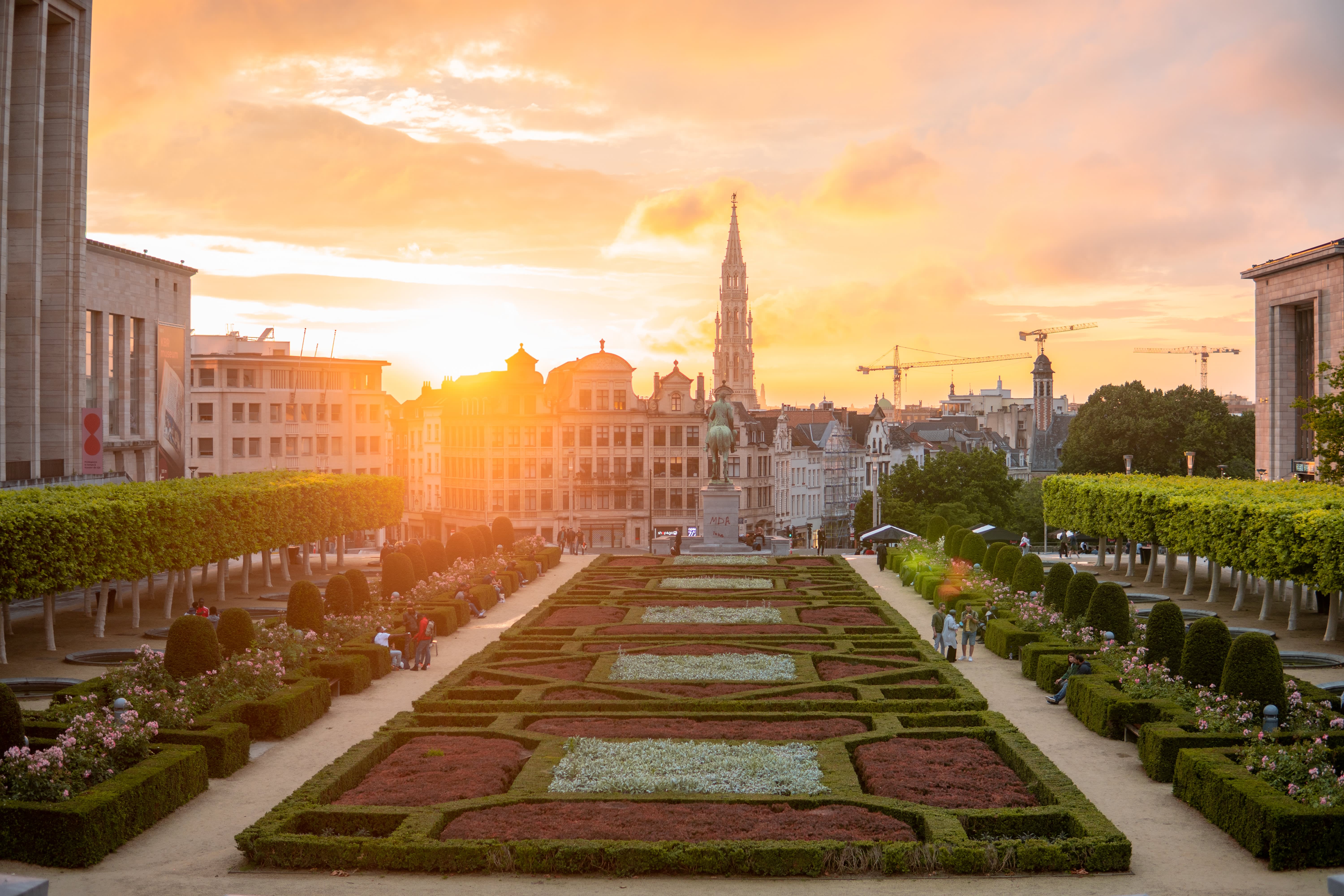Living in Brussels as an expat: Pros and Cons
Manage your expectations in advance and learn the pros and cons of living in Brussels before your move.
Angelina
Considering moving to Brussels? The bilingual capital of Belgium and the EU is a great place to kickstart your career, discover different cultures, brush up your language skills or simply feast on the world-class beer and chocolate. But whatever your reasons are, it’s a good idea to find out the pros and cons of living in Brussels before you actually move there!
Is Brussels a good place to live for expats?
Definitely! With nearly 36% of Brussel’s population being international, it’s an extremely expat-friendly city! Expats particularly love the high living standards and quality of life in Brussels that comes with great healthcare, social security and well-developed public facilities.
The city’s young and international vibe, spirited cultural scene and connectedness to the rest of Europe makes Brussels an expat haven.
International students pick Brussels for the excellent and affordable education opportunities and expat parents appreciate the availability of parks and bilingual schools. Working expats often find Belgium taxes high but still move to Brussels for work a relatively high gross salary and benefits such as the 13th month salary bonus, good work-life balance and plenty of holidays. So no matter the age group, expat life in Brussels is one to be envied.
Pros of living in Brussels

Brussels is as international as it gets
Being the capital of the EU, Brussels is easily one of the most culturally diverse cities in the world. More than 180 nationalities speaking over 100 languages call Brussels their home, making the city one big international family.
Brussels is liberal and open-minded
There is a sense of freedom in Brussels. People from any ethnicity, religion, gender or sexual orientation feel welcome in the capital of Belgium. In fact, it’s one of the most LGBT-friendly cities in the world, according to the Wellbeing Index by Currys PC World and Fitbit.
Same-sex marriage has been legal since 2003 in Brussels and same-sex adoption since 2006.
Brussels has a lively cultural scene

That sense of freedom is what drives the cultural scene of Brussels, giving life to initiatives like Kiosk radio. Based in the Parc Royal, Kiosk is a hang-out spot where everyone is welcome to pass through, dance or sit down and listen to music. A similar informal atmosphere where creatives feel at home can be found in places like Botanique, Les Ateliers Claus, Beursschouwburg and RECYCLART.
The Belgian capital also boasts a remarkable variety of museums and art galleries_including La Patinoire Royale, KANAL–Centre Pompidou and Royal Museum of Fine Arts, just to name a few. The nightlife in Brussels is just as vibrant, with clubs like Fuse and C12 hosting top-notch electronic music acts every weekend.
It’s a city of contrasts

Brussels is an architectural melting pot, so much so that the architectural world even coined the term ‘brusselisation’ to describe this phenomenon of haphazard urban planning during the 1960s and 1970s. You’ll find a collage of art nouveau, neoclassical, neo-renaissance, gothic styles and contemporary buildings.
Some might call Brussels ‘the ugly duckling,’ but, if you ask, it’s the city’s charm, offering unique contrasting landscapes which will surely keep your walks exciting!
Green spaces are all around
Amidst the late mediaeval squares and shiny high-rises of Brussels, you’ll find a plethora of parks and gardens. The City of Brussels alone boasts over 50 parks! Whichever district you find your home in, you’ll always have enough green spaces where you can sport or meet other internationals and locals.
Brussels is very well connected

While having that cosmopolitan feel of London or Paris, Brussels is a city with human scale. The whole surface area of the Brussels-Capital Region (161.4 km²) is smaller than that of the city of Amsterdam (219.3 km²).
You can easily get around Brussels thanks to its dense network of bus, tram and metro lines. Travelling abroad is fairly quick as well because Brussels is well connected with other European capitals. You hop on a train and in a mere 1.5 hours you’ll be in Paris, in 2 hours in London or in 2.5 hours in Amsterdam.
Once you get your Belgian residence permit , you can travel through the EU visa-free!
Cons of living in Brussels

It can be hard to find a job if you don’t speak French or Dutch
Housing headquarters of the EU, NATO and UN, Brussels draws heaps of international talent for political and policy jobs. But as international as Brussels is, it still can be challenging to find an English-speaking job in other fields.
Around 90% of vacancies require you to speak one of the official languages of Brussels. Not having an EEA citizenship or Belgian residence permit makes matters all the more complicated, as it’s more expensive and lengthy for companies to arrange a work visa and relocation for a third-country employee.
So to increase your chances of landing a job in Brussels, start polishing your French or Dutch skills or look for jobs at multinational companies with an international culture.
Belgian bureaucracy can be daunting to deal with
Here’s a revised version with minimal bolding:
Because of the large number of expats living in Brussels, the town halls of most communes are overloaded with work. And truth be told, they aren’t known for being particularly quick or friendly to foreigners. Oftentimes, they’ll refuse to speak to you in English, so it’s a good idea to bring a friend that speaks Dutch or French to translate things for you.
From the moment you apply for your residence permit, it can take from a couple of months to a year before you actually receive it. It’s a lengthy process that includes multiple appointments at the town hall and a police visit to your home address. During this time, the Immigration Authorities might advise you to stay in the country. So stay patient!
Once you get your residence permit, you’ll be able to access most of the governmental services online thanks to your eID!
It’s not cheap to live in Brussels
Living in Brussels isn’t cheap. Especially the prices for groceries and rent] in a sought-after neighbourhood might take up most of your budget. You can expect monthly expenses of around €2,000 if you live in a studio apartment in a nice neighbourhood like Ixelles.
However, if you’re an American moving to Brussels, you’ve probably just let out a sigh of relief. Living in the EU capital is on average 37% cheaper than in the US.
Try to figure out the costs of moving and settling in before you head to Brussels to prevent unwanted surprises.
Keep in mind costs such as municiapl taxes and utility costs to make an accurate estimation of your monthly budget.
Brussels has a complex political system
When people talk about Brussels, they usually mean a region. Yes, you read it right; the City of Brussels is actually one of the 19 communes and the historic centre of the Brussels-Capital Region. To make things more complicated, each of these communes has different rules for … well, pretty much everything.
That includes the registration in your commune and getting a residence permit as well. The documents you’ll need to submit, the means of communication with your town hall — it all differs from commune to commune. So, when you move to Brussels, you should inquire about those from your municipality directly.
Brussels is one of the most congested cities in the world
The planning of Brussels is very car-centric and many people prefer to drive over using public transport. That results in headache-inducing traffic jams and limited parking. So, if you’re going to live in Brussels, we advise you to leave your car behind and use your bike or metro instead. Plus, there’re many options for scooter and bike sharing to choose from. That way you’ll save yourself a lot of stress and contribute to a healthier planet!
Prepare for long, dark and gloomy winters
If you’re used to the sun all year round, getting familiar with the weather in Brussels might be a hard pill to swallow. With its sub-oceanic climate, Belgian weather is humid and rainy with typically cold winters and mild summers. There aren’t many things you can do to brighten up the weather, but you definitely should gear up with some waterproof shoes, a rain jacket and vitamin D ahead of moving to Brussels.
On the bright side, when it’s dry, the summers in Brussels are very pleasant and heaps of people fill up the many parks and squares. Though, in the past years, the summer temperatures have risen, with several heat waves hitting the Belgian grounds. The City of Brussels even developed a so-called heat wave plan to support isolated and weakened persons.
A thing to keep in mind, air conditioning isn’t very common in Belgium. So if your house heats easily, you might need to arm yourself with a fan.
Now that you have a better understanding of the quality of life in Brussels and the pros and cons of living there, do you think it’s the right place for your new home?
This article is for informational purposes only.
Please reach out to content @housinganywhere.com if you have any suggestions or questions about the content on this page. For legal advice or help with specific situations, we recommend you contact the appropriate authorities.
Related articles
In this article
Find your home in Brussels
Browse hundreds of verified rental properties across Brussels' neighbourhoods. Search smart, search safe.
Search Now

